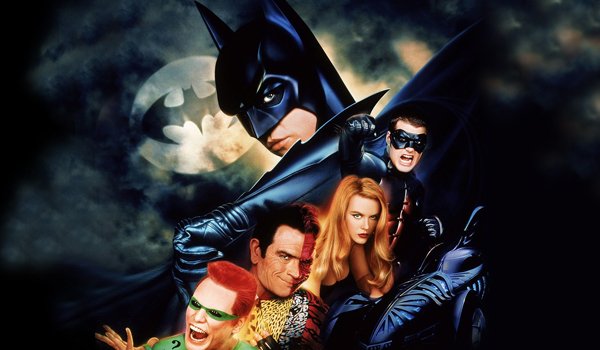Here's Everything Wrong With Batman Forever In One Handy Video

As often bemoaned, the series of Batman films started by Tim Burton's 1989 effort went out in the late 1990's as a kitschy pastel calamity. 1995’s Batman Forever was the beginning of this downhill slide for the once-magnificent movie series. Now, closing in on the 20th anniversary of the film’s release, Cinema Sins gives you 167 reasons why.
Giving Batman Forever a thorough comb-through, Cinema Sins surprisingly gives star Val Kilmer a bit of a pass. However, they not only point out the obvious flaws of the film, like its vacuous vixen of a leading lady played by Nicole Kidman, and the unnecessary, lackluster levity, but they also point out some interesting minor plot holes and anachronisms, giving you even more excuses to hate the film. The video properly grills the ludicrous flick that gave us Bat butt implants and took the brilliant cityscape designs of Burton’s Gotham City and turned it into a dark, psychedelic carnival ride.
However, the brunt of the video’s ire focuses on Tommy Lee Jones’ disappointing performance as Harvey Dent/Two-Face. Certainly, one would think that the grizzled gravitas of Jones would have overcome not only the film’s quirky nature, but the fact that, flying in the face of continuity, he took over a role originated in the first film by Billy Dee Williams. The uber-animated ineptitude of the character seemed to overshadow the attention-grabbing insanity of Jim Carrey’s Riddler. This was highlighted in the video ever so clearly and, as they rightly observe, "He’s out Jim Carrey-ing Jim Carrey."
The series of superhero films that began with Tim Burton’s 1989 Batman was game-changing on so many levels, starting as a dark, daring reinvention of the comic book property whose last live-action rendition had Adam West in a kitschy jumpsuit beating on thugs in a groovy grind. Burton’s follow-up, 1992’s Batman Returns, may have carried a rogues gallery that crowded the crux of the drama, but it still managed to be a worthy sequel in the sense of spirit and atmosphere.
As far as superhero films with the name Joel Schumacher attached, Batman Forever is often defended as the one that "wasn’t good, but not too bad." However, discerning dissers of the Schumacher Batman films will remember that Batman Forever set into motion the ignominious abortion of a movie that followed. It accomplished that feat by becoming a success at the box-office with $336.5 million in 1995, even out-grossing its 1992 predecessor. Just two short years later, the abysmal Batman and Robin, clearly misinterpreting the financial success of Batman Forever as approval of its style, would take that formula, mutating the film into an unwatchable mishmash of random imagery and a star-studded cast lost under its weight.
Was Batman Forever really THAT bad of a film? Yes, in the sense that it set a horrific precedence for a cinematic moment from which the comic book movie genre would take years to recover. No, in the sense that it dared to be stylistically different and showcased a memorable villain in Jim Carrey’s Riddler. That’s about as far as I’d go with the accolades.
Your Daily Blend of Entertainment News
